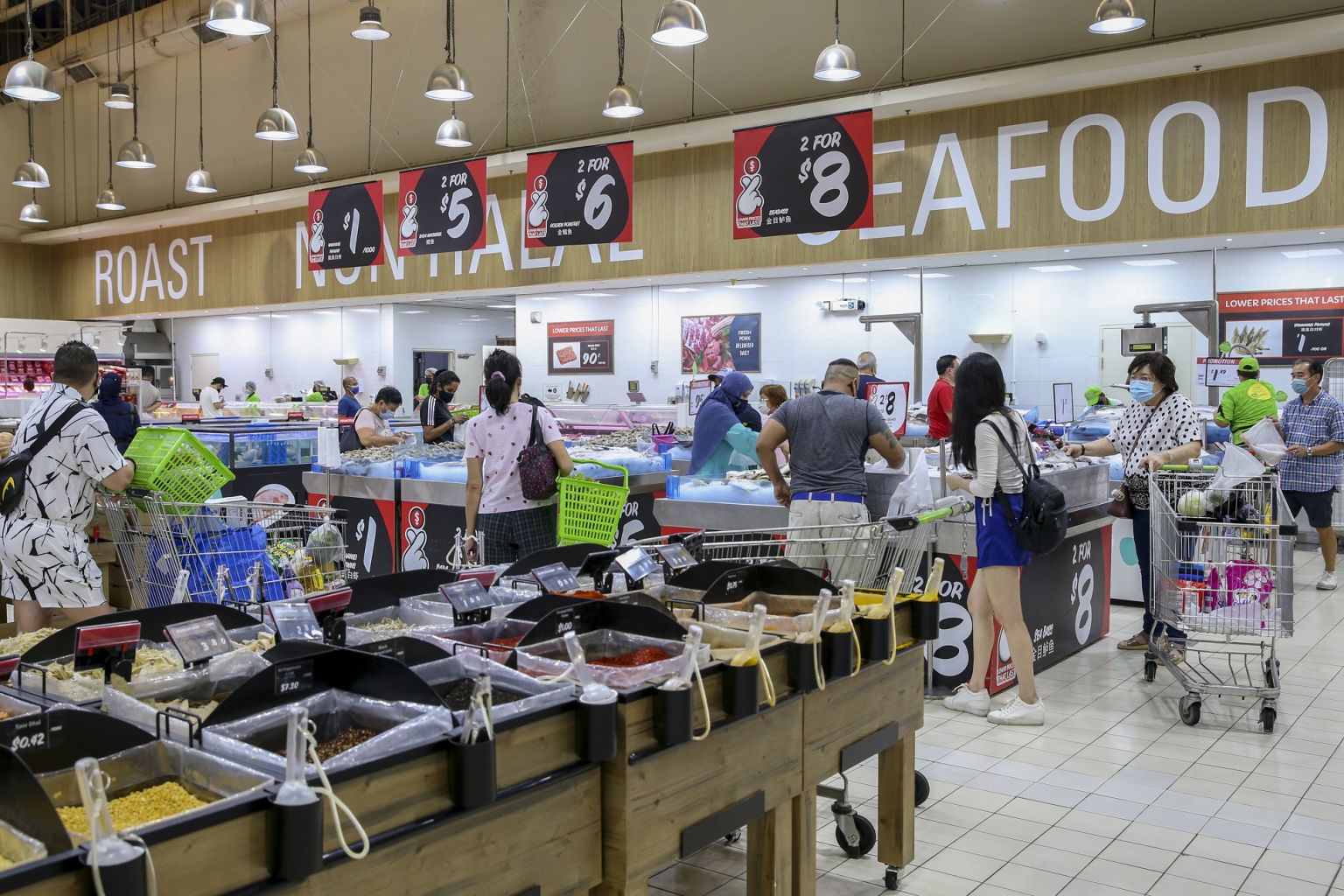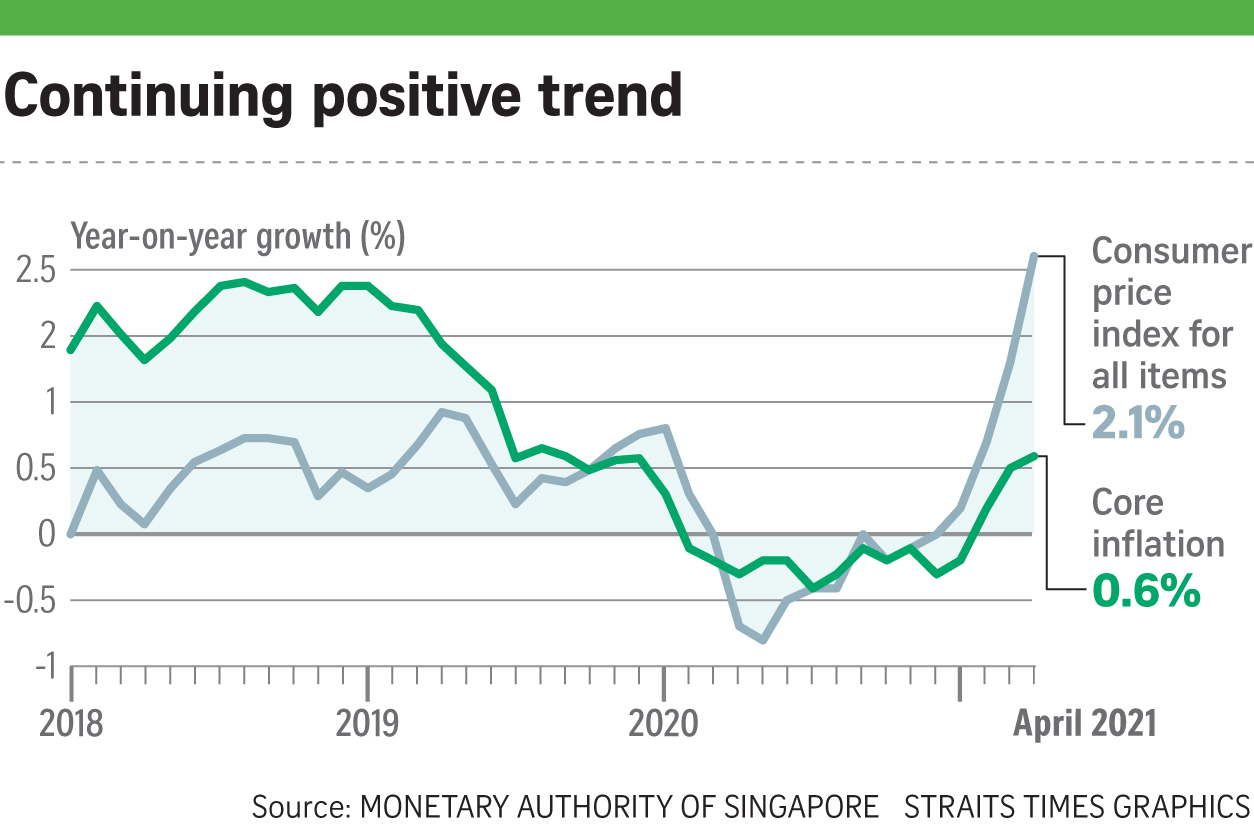Singapore's core inflation positive for 3rd straight month
It rises to 0.6% in April, overall inflation jumps to 2.1%; increase partly due to low base last year
Sign up now: Get ST's newsletters delivered to your inbox

The cost of retail and other goods saw a more gradual decline of 1.1 per cent last month, compared with 1.5 per cent in March. Services inflation, meanwhile, eased to 1.1 per cent, from 1.2 per cent in March.
ST FILE PHOTO
Core inflation in Singapore continued to pick up last month, driven by smaller declines in the costs of electricity and gas, as well as of retail and other goods.
Core inflation, which excludes accommodation and private road transport costs, rose to 0.6 per cent in April compared with the same month last year, according to data out yesterday. It was 0.5 per cent in March.
This is the third straight month core inflation was positive after spending a year in negative territory.
Overall inflation jumped to 2.1 per cent last month, from 1.3 per cent in March, beating the 2 per cent forecast by analysts in a Bloomberg poll. The surge reflected higher private transport and accommodation inflation, and the rise in core inflation.
The increase in both core and headline inflation was partly due to a low base in April last year, when prices fell sharply.
Overall inflation in Singapore is expected to remain around current rates in the near term and ease in the second half of this year as base effects fade, while core inflation will continue to rise gradually, said the Monetary Authority of Singapore (MAS) and Ministry of Trade and Industry (MTI) in a report.
Barclays Bank economist Brian Tan said the rise in core inflation was unexpectedly small last month, which suggests that demand-pull inflation pressures remain weak. Core inflation fell short of the 0.9 per cent forecast by analysts polled by Bloomberg.
Private transport costs surged by 12.9 per cent in April, up from 7.2 per cent the month before, mainly due to a sharper rise in car prices and a pickup in other private transport costs. Accommodation inflation edged up to 0.7 per cent, from 0.5 per cent in March, as housing rents rose faster.
Services inflation, meanwhile, eased to 1.1 per cent, from 1.2 per cent in March, reflecting a fall in telecommunications service fees and lower health insurance inflation. Food inflation fell to 1 per cent, from 1.4 per cent in March, due to lower non-cooked food inflation.
Electricity and gas prices fell at a slower pace of 2.4 per cent, compared with the 9.7 per cent decline in March, due to upward revisions in electricity and gas tariffs.
The cost of retail and other goods likewise declined more gradually, at 1.1 per cent last month compared with 1.5 per cent in March, due to a rise in prices of telecommunications equipment and personal items, and a smaller fall in the cost of personal care products.
MAS and MTI said external inflation has risen amid a recovery in global oil prices and more costly raw goods and services in major economies.
They said core inflation will continue to increase gradually, although recent measures to curb the spread of Covid-19 in Singapore are likely to slightly dampen the pickup in underlying inflation.
The uncertain economic outlook will also weigh on consumer sentiment and price increases in the near term, they added.
Core inflation is expected to average between 0 per cent and 1 per cent this year, while overall inflation is forecast to come in between 0.5 per cent and 1.5 per cent, according to official estimates.
Maybank Kim Eng economists Chua Hak Bin and Lee Ju Ye said the latest phase two (heightened alert) measures may dampen inflation pressures on goods and services such as point-to-point transport, clothing and footwear, as well as recreation and culture.
"But we do not expect the impact on prices to be as significant as the second quarter of last year, when... global demand collapsed. The United States, United Kingdom and Europe are reopening, which could fan global commodity prices," added Dr Chua and Ms Lee, who expect overall inflation to come in at 1.3 per cent and core inflation at 0.9 per cent this year.
JP Morgan analyst Ong Sin Beng cautioned that while the restrictions here are expected to be relaxed next month, it is not clear that the labour market might be as quick to respond.
He said: "The risk is that the longer this uncertainty around Covid-19 persists, so too does the likelihood of hysteresis across sectors with its knock-on (effect) on labour markets."



